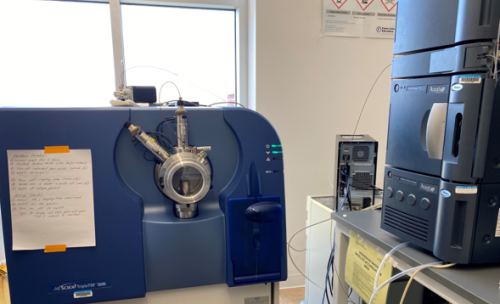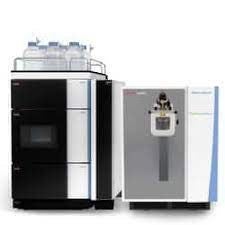Welcome to the Proteomics Core Facility
The Proteomics Core Facility, College of Pharmacy at the University of Rhode Island, was established in July 2022, is equipped with state-of-the-art instrumentation, including the AB SCIEX TripleTOF™ 5600 and two Thermo Scientific™ Orbitrap Exploris™ 240 mass spectrometers. Our facility has recently expanded to include an additional Orbitrap Exploris™ 240 coupled with a nano-flow HPLC system forthcoming.
We specialize in comprehensive bottom-up proteomics workflows, offering expertise in sample preparation for a wide range of biological materials, such as cells, cerebrospinal fluid, and tissues. Our data acquisition strategies encompass both data-independent acquisition (DIA) and data-dependent acquisition (DDA) approaches, supported by robust downstream analysis workflows, including DIA and directDIA analysis.
In addition to our cutting-edge capabilities, we maintain strong collaborative networks with leading proteomics institutions, including the IDEA National Resource for Quantitative Proteomics (https://idearesourceproteomics.org/ ) and the Proteomics & Metabolomics Facility at the University of Connecticut (https://proteomics.uconn.edu/ ).
We welcome inquiries and are eager to collaborate on research projects that can benefit from our expertise and resources. For any questions or partnership opportunities, please contact Dr. Chang Liu at hichang813@uri.edu.
Instruments
AB SCIEX TripleTOF 5600 system
 The AB SCIEX TripleTOF 5600 system includes a mass spectrometer, a DuoSpray™ ion source, a High frequency LINAC® Collision Cell, an Accelerator TOF Analyzer, a Detection system, and a computer running the Analyst TF 1.7.1 software. Key features include enhanced selectivity with differential ion mobility, robust spray with the DuoSpray™ Turbo V Source, comprehensive coverage with data-independent SWATH acquisition, and maximize flexibility with front end separations. The AB SCIEX TripleTOF 5600 system is coupled to an Acquity UPLC H-Class system for chromatographic separation.
The AB SCIEX TripleTOF 5600 system includes a mass spectrometer, a DuoSpray™ ion source, a High frequency LINAC® Collision Cell, an Accelerator TOF Analyzer, a Detection system, and a computer running the Analyst TF 1.7.1 software. Key features include enhanced selectivity with differential ion mobility, robust spray with the DuoSpray™ Turbo V Source, comprehensive coverage with data-independent SWATH acquisition, and maximize flexibility with front end separations. The AB SCIEX TripleTOF 5600 system is coupled to an Acquity UPLC H-Class system for chromatographic separation.
Thermo Scientific Orbitrap Exploris 240 LC/MS System
 The Thermo Scientific Orbitrap Exploris 240 LC/MS System showcases exceptional prowess in distinguishing target ions amidst complex sample interferences, delivering an impressive resolution of up to 240,000 (FWHM) at m/z 200. Expanding its capabilities further, the inclusion of the Thermo Scientific BioPharma option enables the analysis of large molecules reaching up to m/z 8000 (accessible upon request). Meanwhile, the Vanquish Flex (micro-flow) and Neo (nano-flow) LC systems present a broad flow rate spectrum, ranging from a minimum of 1 nano liter per minute to a maximum of 8 milliliters per minute, ensuring adaptability across diverse chromatographic requirements. Both data-dependent acquisition (DDA) and data-independent acquisition (DIA) strategies have been fully established on this platform for comprehensive bottom-up proteomics workflows.
The Thermo Scientific Orbitrap Exploris 240 LC/MS System showcases exceptional prowess in distinguishing target ions amidst complex sample interferences, delivering an impressive resolution of up to 240,000 (FWHM) at m/z 200. Expanding its capabilities further, the inclusion of the Thermo Scientific BioPharma option enables the analysis of large molecules reaching up to m/z 8000 (accessible upon request). Meanwhile, the Vanquish Flex (micro-flow) and Neo (nano-flow) LC systems present a broad flow rate spectrum, ranging from a minimum of 1 nano liter per minute to a maximum of 8 milliliters per minute, ensuring adaptability across diverse chromatographic requirements. Both data-dependent acquisition (DDA) and data-independent acquisition (DIA) strategies have been fully established on this platform for comprehensive bottom-up proteomics workflows.
Research Team
Chang Liu, Ph.D. Lead Investigator for bottom-up proteomics workflows, overseeing all stages from sample preparation to data analysis. (https://web.uri.edu/pharmacy/meet/changliu/)
Ang Cai, Ph.D. Lead Specialist for mass spectrometry instrumentation, responsible for the operation and optimization of analytical platforms. (https://web.uri.edu/pharmacy/meet/angcai/)
Christopher Hemme, Ph.D. Lead for bioinformatics workflows, focusing on data integration and computational analysis of large-scale proteomic datasets. (https://web.uri.edu/pharmacy/meet/christopher-hemme/)
Publications
- Li, H., Deng, N., Yang, J., Zhao, Y., Jin, X., Cai, A., Seeram, N.P., Ma, H., Li, D., Yang, H. and Liu, C., 2025. Anti-inflammatory and antioxidant properties of oleuropein in human keratinocytes characterized by bottom-up proteomics. Frontiers in Pharmacology, 15, p.1496078. https://pubmed.ncbi.nlm.nih.gov/39845787/
- Puopolo, T., Seeram, N.P. and Liu, C., 2024. Chloroform/Methanol Protein Extraction and In-solution Trypsin Digestion Protocol for Bottom-up Proteomics Analysis. Bio-protocol, 14(16), p.e5055. https://bio-protocol.org/en/bpdetail?id=5055&type=0
- Li, H., Puopolo, T., Seeram, N.P., Liu, C. and Ma, H., 2024. Anti-Ferroptotic Effect of Cannabidiol in Human Skin Keratinocytes Characterized by Data-Independent Acquisition-Based Proteomics. Journal of Natural Products. https://pubs.acs.org/doi/10.1021/acs.jnatprod.3c00759
- Puopolo, T., Chen, Y., Ma, H., Liu, C. and Seeram, N.P., 2024. Exploring immunoregulatory properties of a phenolic-enriched maple syrup extract through integrated proteomics and in vitro assays. Food & Function, 15(1), pp.172-182. https://pubs.rsc.org/en/content/articlelanding/2024/fo/d3fo04026g
- Li, H., Deng, N., Puopolo, T., Jiang, X., Seeram, N.P., Liu, C. and Ma, H., 2023. Cannflavins A and B with Anti-Ferroptosis, Anti-Glycation, and Antioxidant Activities Protect Human Keratinocytes in a Cell Death Model with Erastin and Reactive Carbonyl Species. Nutrients, 15(21), p.4565. https://www.mdpi.com/2072-6643/15/21/4565
- Puopolo, T., Li, H., Ma, H., Schrader, J.M., Liu, C. and Seeram, N.P., 2023. Uncovering the anti-inflammatory mechanisms of phenolic-enriched maple syrup extract in lipopolysaccharide-induced peritonitis in mice: insights from data-independent acquisition proteomics analysis. Food & Function, 14(14), pp.6690-6706. https://pubs.rsc.org/en/content/articlelanding/2023/fo/d3fo01386c
